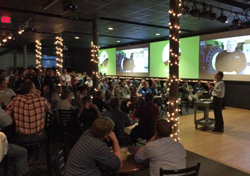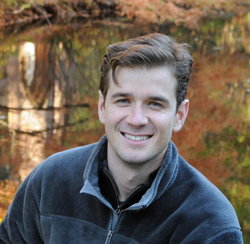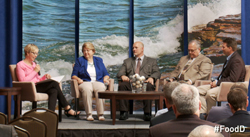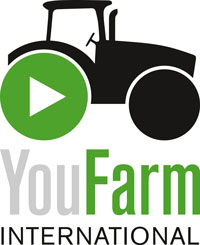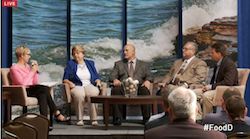
From left to right: Gail Hogan, retired Emmy award winning broadcast journalist; Sandy Bihn, president, Toledo Lighthouse Society and executive director, Lake Erie Waterkeeper Inc.; Chuck Campbell, acting commissioner of water treatment, city of Toledo; Rich Nachazel, president, Destination Toledo, Inc,; and Adam Sharp, vice president of public policy, Ohio Farm Bureau Federation
All things water were discussed this morning during the Food Dialogues: Toledo event. On August 2, 2014 a toxic algal bloom caused nearly 500,000 people to be without water. The event led to discussions around how to balance the need for clean water with the need for food. The conversation was continued through two panel discussions with the first panel, “Lessons from Toledo Water Crisis,” moderated by Gail Hogan and featuring Sandy Bihn, president, Toledo Lighthouse Society and executive director, Lake Erie Waterkeeper Inc.; Chuck Campbell, acting commissioner of water treatment, city of Toledo; Rich Nachazel, president, Destination Toledo, Inc,; and Adam Sharp, vice president of public policy, Ohio Farm Bureau Federation.
The panelists noted that the event brought water issues to the forefront of consumers’ minds while Nachazel noted it brought a black eye to the state and efforts are being made to counter the issue with positive images and information. And its working. Interestingly, he noted that $12.9 billion dollars come in to the state via tourism and 28 percent of these funds raised by eight counties surrounding Lake Erie so it is imperative they keep the lake healthy.
While water emergency plans were in place prior to the issue, it brought to light some areas that could be better addressed. Today Campbell said his organization has updated preparedness plans, and revised operating procedures along with implementing other measures. While Biln noted that they learned testing needed to be improved, she believes this has largely been solved through collaborative efforts among all industries that play a role in water quality.
But all panelists noted that more work needs to be done and there needs to be more funding to conduct extensive, ongoing research.
An important user of water is the agricultural industry and as Jack Fisher, executive vice president of the Ohio Farm Bureau Federation pointed out, the Ag industry is often accused of causing water quality issues. While he acknowledged that agriculture plays a role, there are other factors including those noted by John Knights, executive director for the Nature Conservancy, septic systems and water treatment facilities.
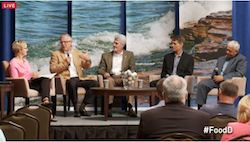
From Left to Right: Gail Hogan, retired Emmy award winning broadcast journalist; Jack Fisher, executive vice president, Ohio Farm Bureau Federation; Josh Knights, executive director, The Nature Conservancy in Ohio; Jay Martin, lead faculty for the Global Water Initiative and the Field to Faucet Program, Ohio State University; and Terry McClure, vice chairman, Ohio Soybean Council Board
The two were joined by Jay Martin, lead faculty for the Global Water Initiative and the Field to Faucet Program, Ohio State University; and Terry McClure, vice chairman, Ohio Soybean Council Board in the second panel, “Balancing the Food and Water Question”.
The panel agreed that everyone was working together and the process was going well but that it must be an ongoing effort- there is still much to learn. For example, Martin said their research is looking at ways to improve processes and much of this is being done directly with the help of farmers. Today, said McClure, there are 32 sites doing field testing. “As we make adjustments, we will better understand how we can improve,” said McClure.
In the efforts among the Ag industry, money has not been a barrier. Fisher said they have received federal and state funding and the state’s Ag industry has allocated $2 million for water quality research because the industry knows that research is a major component of solutions.
You can watch a replay of both panels here.
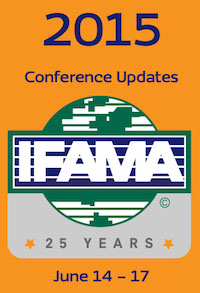 You are invited to join the 25th Annual Internation Food and Agribusiness Management Association (IFAMA) World Conference in Saint Paul, MN on June 14-17, 2015.
You are invited to join the 25th Annual Internation Food and Agribusiness Management Association (IFAMA) World Conference in Saint Paul, MN on June 14-17, 2015.
 Attendees will participate in discussion and presentations focusing on three key areas of concern for the food industry: People, Climate and Big Data. Keynote speakers include Mary Bohman, USDA Head of Economic Research Service and Michael Patrick, Pioneer-DuPont Director of Human Resources (pictured), along with other experts in the industry and academia.
Attendees will participate in discussion and presentations focusing on three key areas of concern for the food industry: People, Climate and Big Data. Keynote speakers include Mary Bohman, USDA Head of Economic Research Service and Michael Patrick, Pioneer-DuPont Director of Human Resources (pictured), along with other experts in the industry and academia.







